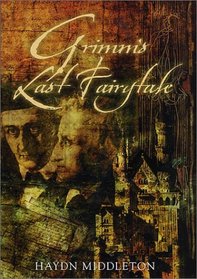Three interwoven stories.
The main plot deals with the folklorist Jacob Grimm, nearing the end of his life and in failing health. He is cared for by his niece, Auguste, and a servingman, Kummel. The relationships between all three are fraught with tension and secrets.
In flashback-style, we also learn about the young Jacob and his (rather unhealthy, interdependent) relationship with his younger brother, Willi.
Interspersed with these two segments is a retelling of the story of Sleeping Beauty, mixed with elements of other fairytales and some entirely new additions.
By an Oxford grad, the book is surely not without literary merit, but I wished that the story had focused less on Augustes angst and more on the historical details of the Grimms lives and work. I had hoped to come away from reading this book feeling that I knew much more about the brothers but I didnt.
I liked the fairytale segment, but its function seemed, to me, to mostly be illustrative to show an unsanitized version of an old story. The issues brought up thematically in that section, I felt, should have related back to the story going on in the other segments but they really didnt.
I also couldnt help feeling that Middleton wasnt really inside the heads of his characters. A sense of time and place (Germany, 19th century) was established by throwing in stuff like gratuitous references to schnitzels rather than through the characters. And finally, I found Middletons indirectly-implied thesis that German fairytales are somehow related to Nazism to be annoying and offensive (he makes a comment about how the German versions of fairytales were distinctly nastier than, say, the French versions which I think is definitely arguable and probably untrue.) The author also uses Grimms belief in folklore being an important part of our heritage to imply that the nastiness of the stories says something about the German people as a whole. The character of Kummel, who is entirely fictional, is included merely to give the author a chance to bring up anti-Semitism, and I found it totally irrelevant to bring up, in the afterword, that Hitler used versions of Grimms book to promote the German folk community.
The Grimms were not anti-Semites, they died well before the rise of Nazism, and I dont believe that fairytales have any culpability for or connection to fascism in any form.
This theme is not by any means the largest part of the book, I think its just something that Im personally sensitive to.
The main plot deals with the folklorist Jacob Grimm, nearing the end of his life and in failing health. He is cared for by his niece, Auguste, and a servingman, Kummel. The relationships between all three are fraught with tension and secrets.
In flashback-style, we also learn about the young Jacob and his (rather unhealthy, interdependent) relationship with his younger brother, Willi.
Interspersed with these two segments is a retelling of the story of Sleeping Beauty, mixed with elements of other fairytales and some entirely new additions.
By an Oxford grad, the book is surely not without literary merit, but I wished that the story had focused less on Augustes angst and more on the historical details of the Grimms lives and work. I had hoped to come away from reading this book feeling that I knew much more about the brothers but I didnt.
I liked the fairytale segment, but its function seemed, to me, to mostly be illustrative to show an unsanitized version of an old story. The issues brought up thematically in that section, I felt, should have related back to the story going on in the other segments but they really didnt.
I also couldnt help feeling that Middleton wasnt really inside the heads of his characters. A sense of time and place (Germany, 19th century) was established by throwing in stuff like gratuitous references to schnitzels rather than through the characters. And finally, I found Middletons indirectly-implied thesis that German fairytales are somehow related to Nazism to be annoying and offensive (he makes a comment about how the German versions of fairytales were distinctly nastier than, say, the French versions which I think is definitely arguable and probably untrue.) The author also uses Grimms belief in folklore being an important part of our heritage to imply that the nastiness of the stories says something about the German people as a whole. The character of Kummel, who is entirely fictional, is included merely to give the author a chance to bring up anti-Semitism, and I found it totally irrelevant to bring up, in the afterword, that Hitler used versions of Grimms book to promote the German folk community.
The Grimms were not anti-Semites, they died well before the rise of Nazism, and I dont believe that fairytales have any culpability for or connection to fascism in any form.
This theme is not by any means the largest part of the book, I think its just something that Im personally sensitive to.




